Entertainment
In the mystery 'Eric,' desperation and decline manifest into a life-size monster puppet
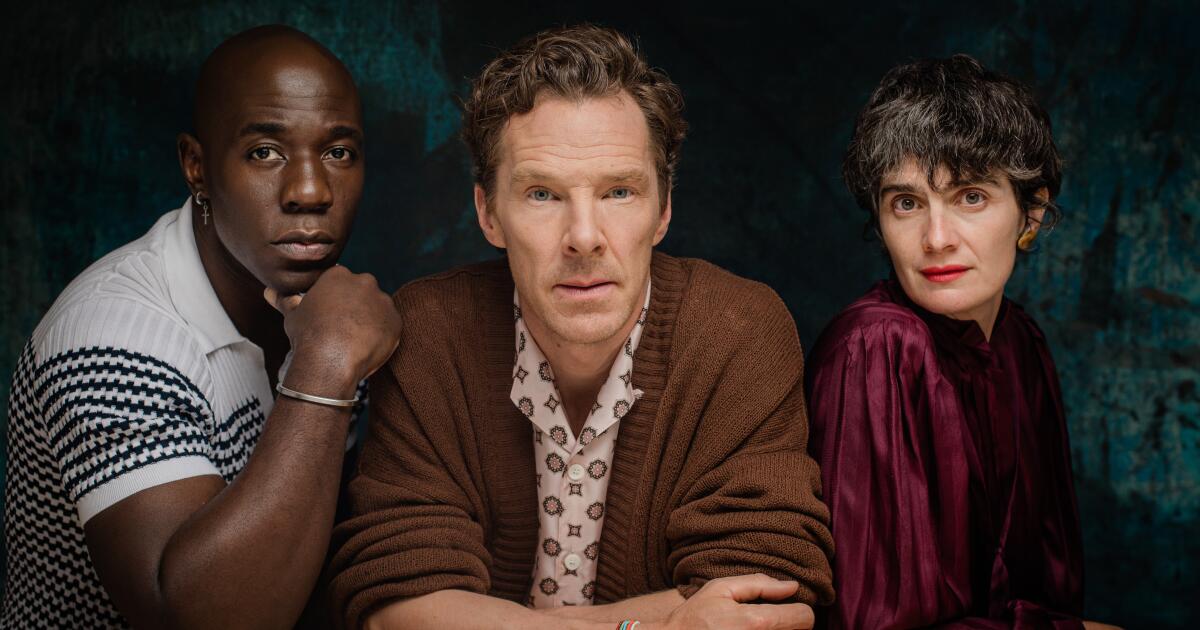
The most idiosyncratic and striking moment on TV this summer? It could be Benedict Cumberbatch as a father running through the streets of New York in a giant, fuzzy blue monster puppet getup amid a desperate attempt to reconnect with his son.
It may sound like some sweet magical adventure, but that’s not the style of British screenwriter Abi Morgan, who created “Eric” for Netflix. She isn’t afraid to tackle big subjects and her body of work — including “Shame” (2011), which tackles sex addiction; “Suffragette” (2015), about women’s suffrage in the U.K.; and TV dramas “The Hour” and “The Split” — often leaves viewers emotionally strung out in its intense examination of human behavior, internal battles and broken systems. And “Eric” is just as visceral.
Set in 1980s New York City, the initial episode of the limited series finds Cumberbatch’s Vincent Anderson, a puppeteer and creator of a “Sesame Street”-esque children’s show “Good Day Sunshine,” exasperated by work demands and his floundering marriage to Cassie (Gaby Hoffmann). The couple’s troubles intensify when their 9-year old son, Edgar (Ivan Howe), goes missing on his walk to school. Torn up by guilt, Vincent is convinced if he turns his son’s drawing of a blue monster, Eric, into a life-size puppet on TV, Edgar will come home. And tasked with investigating the boy’s disappearance is Michael Ledroit (McKinley Belcher III), a Black and queer detective whose closeted identity becomes an obstacle at work as he pursues the case.
Eric, the life-size monster puppet, and Benedict Cumberbatch as Vincent.
(Netflix)
Morgan started with a simple idea: Can we live in a world where a kid can walk to school and come home safely? In exploring that question, the series weaves a lot of issues that plagued the city at the time: rising crime rates, a forgotten underclass, the AIDS epidemic, endemic racism, as well as government mismanagement and corruption.
“There were parallel themes that just became very apparent to me,” Morgan said during a press day with the cast in Los Angeles. “We’re looking at a world where the parents become children and the children become parents in some ways. And the notion of what is a family beyond the nuclear family of the Andersons? There’s a wider family of our city. Who looks after us in the city? Can we trust those parents — be that government, local council or our police force? And when those systems break down and expose themselves, where do we find our new boundaries of trust?”
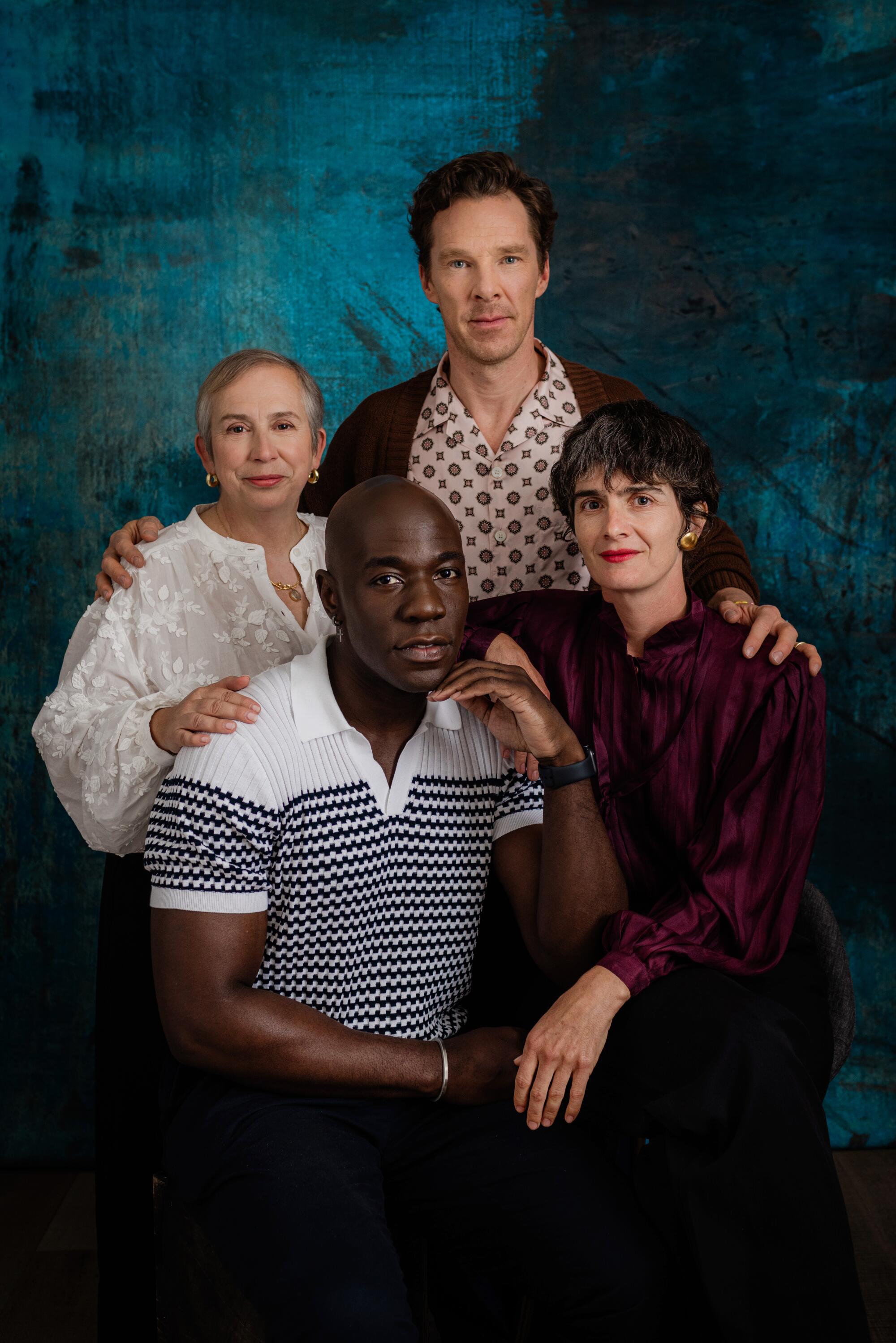
From left, clockwise: Series creator Abi Morgan, Benedict Cumberbatch, Gaby Hoffmann and McKinley Belcher III. Morgan said the show was partly inspired by her time in New York.
(Jason Armond / Los Angeles Times)
Morgan sees the show as a way for audiences to ask themselves those questions through Vincent’s journey. And the city’s many issues presented in the series, inspired by Morgan’s time spent in New York in the ‘80s, added another dimension to the inciting mystery. “There was this dark underbelly. It hadn’t had that cleanup,” she said. “There was something very particular about the ‘80s — it was a melting pot and a point of change, a point of shifting sands, filled with fear and hope, and moments of great freedom and moments of really pushing down that freedom. It felt like a really rich fabric and tapestry in which to set ‘Eric.’”
With no shortage of real and existential horror lurking outside, Morgan knew from the beginning she wanted to bridge the story with a space that provided safety and comfort. Influenced by her own childhood spent backstage with her theater director father, observing how sets were created and the way costumes came to life, she saw “Good Day Sunshine” as a contrast to the city’s roughness and a way to dig deeper into how Vincent, who begins the series already on shaky ground before his mental health declines further, copes with his reality.
“He’s trying to re-create his childhood and idealizing something that was less than ideal,” Cumberbatch said. “His mental health crisis was brushed under the carpet with pharmaceuticals and very cold, cut-off, loveless parenting … he’s invested so much of himself in that show from a need that was never satisfied in his childhood.”
Morgan added that “Good Day Sunshine” is a world that Vincent can control, unlike his own, and that the puppets give life to his voices as he struggles with his mental health and alcoholism. It’s also a way to signal the value of pursuing a creative life, which stands in contrast to that of his estranged parents, particularly his father, a wealthy developer.
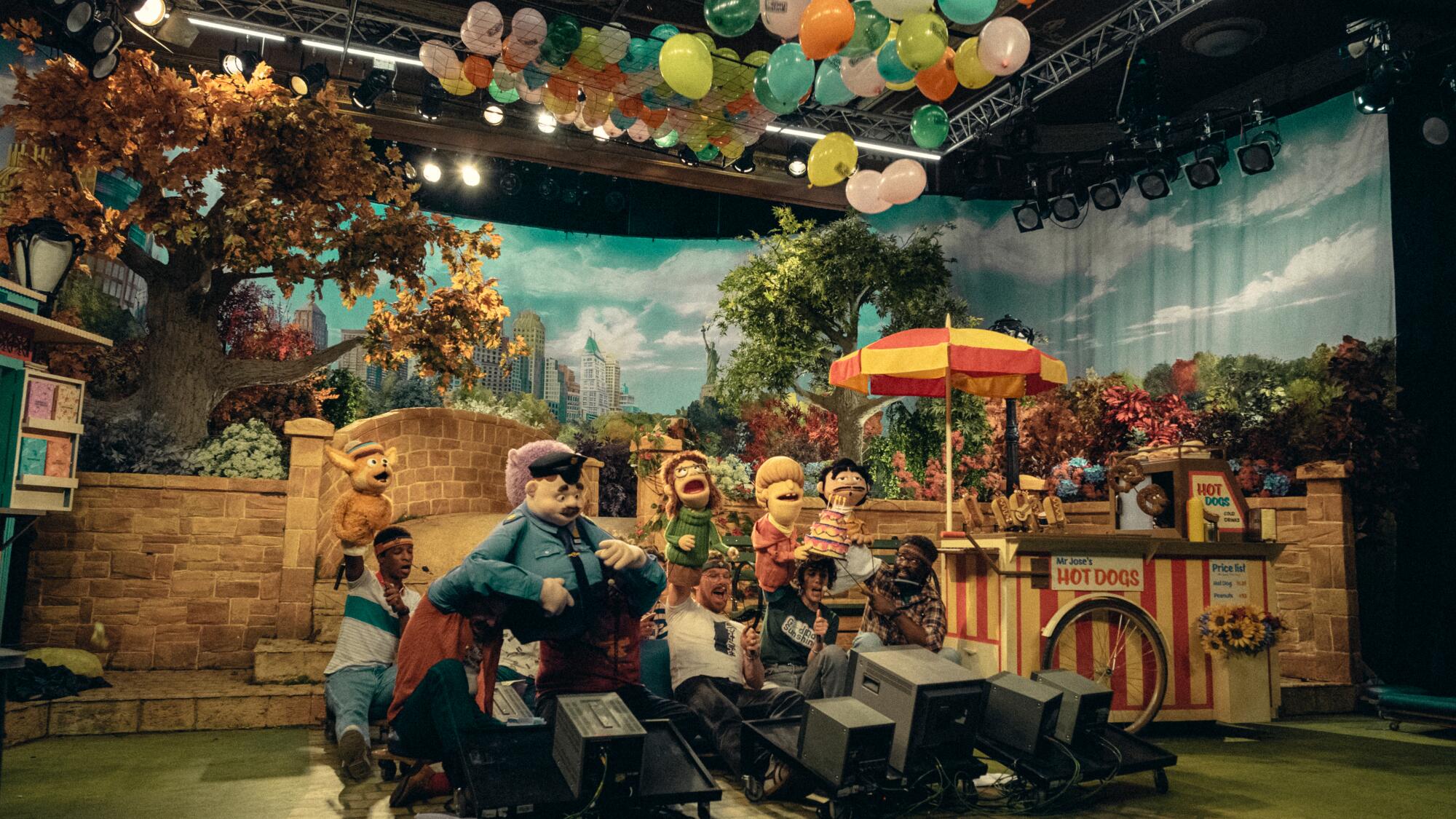
The set of “Good Day Sunshine,” the “Sesame Street”-esque show in Netflix’s “Eric.”
(Ludovic Robert / Netflix)
”That creativity is a way to liberate, heal, manage and help understand ourselves,” Morgan said. “Vincent’s desire to create a world of good, is probably one of the healthier things he has done.”
As a show within the show, “Good Day Sunshine” features an assortment of puppet characters — a mix of animals, inanimate objects and people — including one operated and voiced by Vincent, putting Cumberbatch’s chameleon voice work into practice (his eclectic credits include the dragon Smaug in “The Hobbit” trilogy and the Grinch in the eponymous 2018 animated film). Before he goes missing, Edgar observes his father at work from the sidelines and, later, watches as Vincent becomes agitated with notes from network bosses, demanding that the show broaden its appeal to get viewership numbers up, with a new puppet as a possible solution. On the subway ride home, Edgar suggests his idea for the puppet, Eric, to little fanfare from his dad.
Morgan credits series director Lucy Forbes with being a key architect behind the 7-foot monster puppet, which took roughly four weeks to perfect. Eric is a manifestation and an amalgamation of details in Edgar’s mind — a tail that mimics his cat and fur that matches the chevron of his grandmother’s mink. Vincent becomes convinced that bringing Eric to life could help bring Edgar back, and as he begins to mold the puppet from foam, Vincent also begins to hallucinate Eric, a manifestation of his inner voice, into existence in his quest to find the boy.
Cumberbatch felt the exploration of the imagined other — a device done before, including in films like “Harvey” (1950) and “Ted” — in the larger context of the story was intriguing. And bringing depth to the surreal is familiar territory for the actor, who has done green screen and motion-capture acting and understands the commitment required to make it believable. Still, as Cumberbatch tells it, acting opposite puppeteer Olly Taylor in a plush, furry costume as his character Vincent was falling apart was a surprisingly grounded experience.
“I’d often do line runs with Olly, who’s a really brilliant actor and incredibly capable puppeteer,” he said. “I tried the [Eric] voice out, I’d often read lines and sometimes not; he just got it and the rhythm was the only way it could be for Eric in that moment. It was all about trying to remind ourselves what the purpose of Eric was in relation to [Vincent’s] state of mind. At one point, I tried on the [puppet] headgear and I cried. I just had this wave of empathy for Olly and the performance he had to give in that contraption. It’s a miraculous skill.”
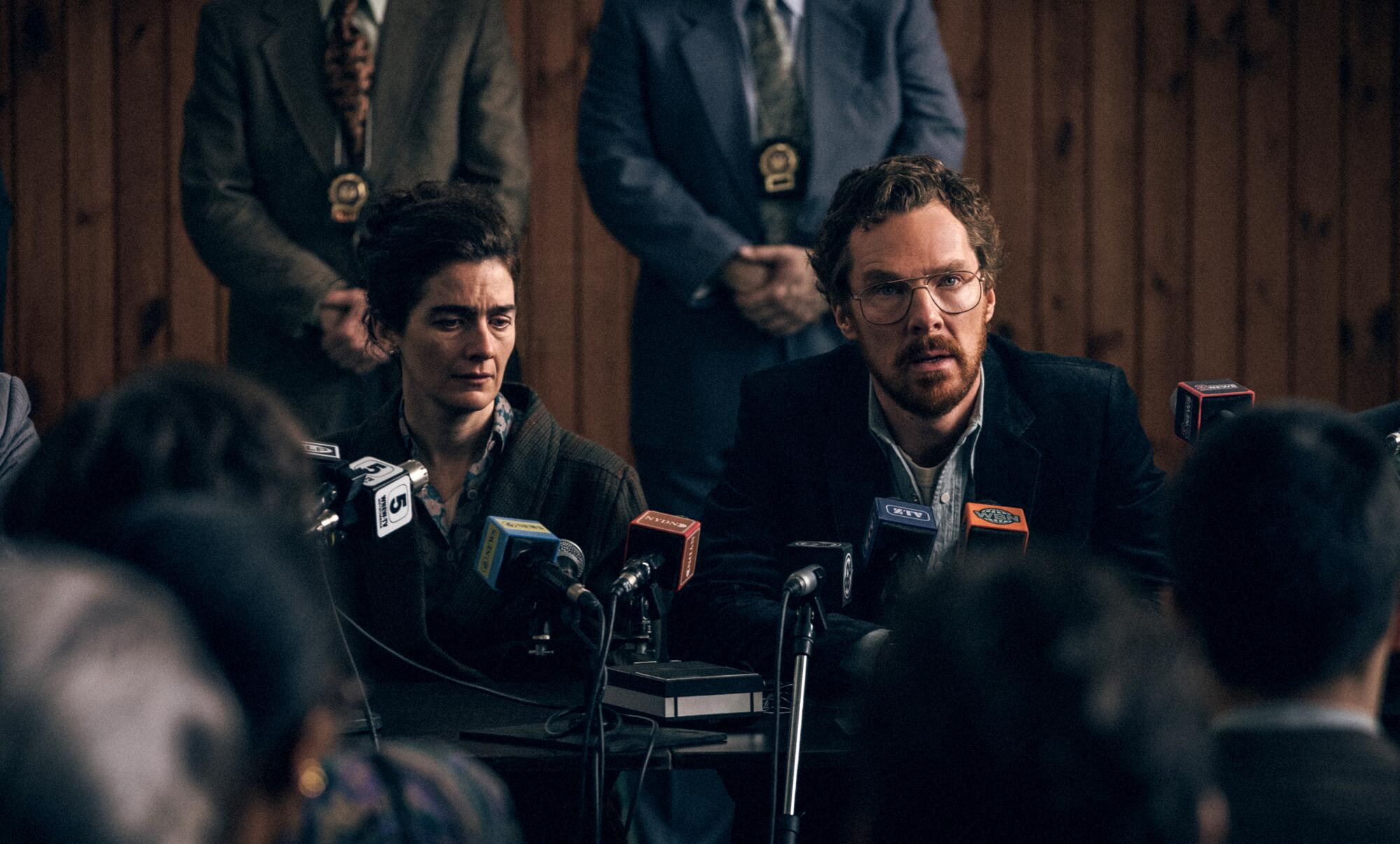
A scene from “Eric,” where Cassie (Gaby Hoffmann) and Vincent (Benedict Cumberbatch) hold a news conference to ask for the public’s help in finding their son, Edgar.
(Ludovic Robert / Netflix)
The puppet element helped soften some of the script elements for Hoffmann. As a mother of two children, the actor said she was initially hesitant about the heavy subject matter, but grew eager about its singular dynamic and the way the series explores the various breakdowns of systems, small and large. The series first captures the unraveling of a social institution — marriage — as Vincent and Cassie veer in opposite directions, and examines how their behavior negatively affects the parent-child dynamic.
“Vincent and Cassie are two very different people who are dealing with the world in two very different ways,” she said. “But I think that Cassie hasn’t been active in an honest way, on behalf of her son, for a while now — and on behalf of herself. I think that she knew that she needed to leave the marriage, and that it wasn’t a healthy environment for [Edgar]. As we come to find out, she has secrets and is in some denial. She’s not as deeply in it, and she’s not as avoidant and terrified of her emotions as Vincent is, or distracting herself with as many substances, but the disappearance… she definitely feels a sense of responsibility.”
When Morgan started to incorporate Ledroit into the story, she was determined not to make him a secondary character. She wanted Ledroit to go on his own journey, informed by his identity, and coming up against all the institutions — the precinct where he works or the gay nightclubs he used to visit — that are making him question his identity similar to Vincent. Playing a Black queer detective who is challenging the norm in the ‘80s, Belcher understood that sense of duty and purpose.
“In a story like this, it would be very easy for him to just turn into a cop that comes to work and deal with the information and solving the case. But it’s really exciting as a Black queer man, to show up with all the baggage that Ledroit would be carrying in the ‘80s, to wrestle with stuff, but to leave him in a place of action that is going to be the change.”
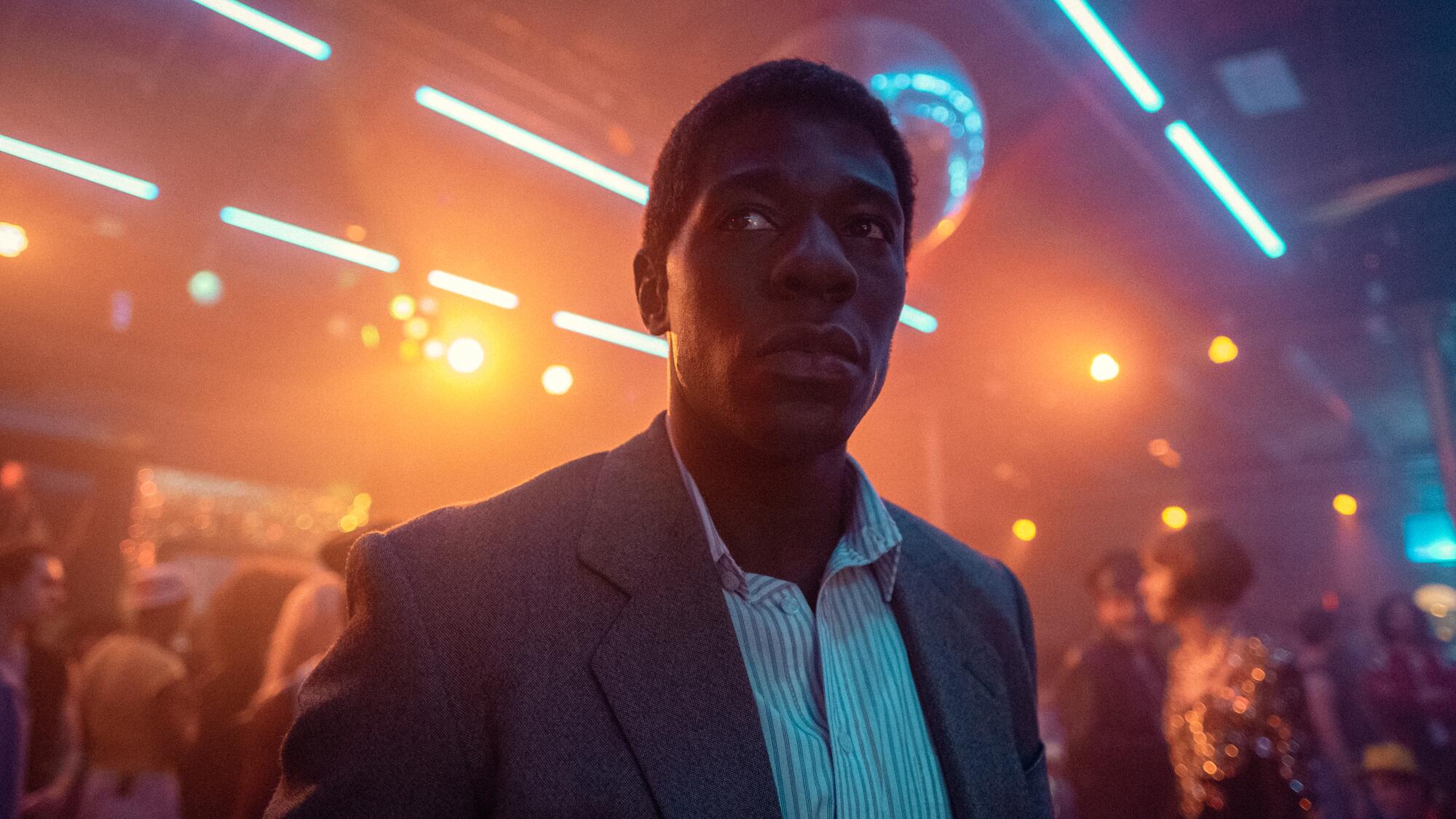
Det. Michael Ledroit (McKinley Belcher III) is charged with finding Edgar.
(Ludovic Robert / Netflix)
Belcher also acknowledged that though the Black community isn’t a monolith, they have a complicated relationship with law enforcement. He sees his character as an instrument of change within the institution.
“I think over the course of the six episodes, that’s a place he lands on: Oh, this is what’s required for us to do what we’re really here for. And it means I must call out injustice; it means I must be intolerant of corner cutting; it means I have to own who I am and stand firmly in that and stand up as a man and say ‘no,‘” he said.
The various threads in the series take some time to come together, making for a premise that can take some finesse in distilling. But that’s what the team behind the series hopes sets it apart.
“You felt held by an imagination that contained worlds within the worlds of the story,” Cumberbatch said. “It felt fresh and new — trying to explain it to people was interesting. I’ve never really heard of anything quite like this before.”
It’s why all these months later, cozy on a sofa with Hoffmann, Cumberbatch can’t help but chuckle wistfully while recalling a moment in the series that had him, as Vincent, wearing the fuzzy Eric costume and running through the streets.
“Running and running and running and running,” Cumberbatch said. “It’s the knife-edge thing with this drama; it is very f— funny, but also weirdly heroic and desperately sad and poignant.”

Entertainment
Paramount-Warner Bros. deal stirs fears about what it means for CNN

As the media industry took stock of Paramount Skydance’s startling acquisition of Warner Bros. Discovery, one question lingered on the minds of many in the news business and beyond: What will this mean for CNN?
The iconic 24-hour cable news network is among the various Warner Bros. assets that would be scooped up by Paramount in a deal announced Thursday that could transform the media landscape.
Paramount has undergone a swift transformation under Chief Executive David Ellison following his family’s acquisition of the company last summer. These changes reached CBS News almost immediately with the appointment of Bari Weiss, the controversial Free Press co-founder, as its new editor in chief.
Bari Weiss moderated a town hall with Erika Kirk, widow of slain conservative activist Charlie Kirk.
(CBS via Getty Images)
Weiss’ tenure so far has been rocky.
Her decision to pull a “60 Minutes” story about conditions inside an El Salvador prison that housed undocumented Venezuelan migrants from the U.S. received widespread criticism and accusations of political motivation. The network said the story was held for more reporting, and the segment eventually aired.
There was more upheaval last week at the news magazine, when “60 Minutes” correspondent and CNN news anchor Anderson Cooper announced that he’d be leaving to spend more time with his family.
And earlier this year, a veteran producer at “CBS Evening News With Tony Dokoupil” was fired after he expressed disagreement about the editorial direction of the newscast.
Now, the concern is that similar changes could be in store for CNN, which has long been a target of President Trump’s ire. He has personally called for the ouster of hosts at the network who have questioned his policies.
CNN Worldwide Chief Executive Mark Thompson tried to quell some of those fears, particularly inside his own newsroom.
In an internal memo dated Thursday and obtained by The Times, Thompson urged employees not to “jump to conclusions about the future” and try to concentrate on their work.
“We’re still near the start of what is already an incredibly newsy year at home and abroad,” he wrote in the note. “Let’s continue to focus on delivering the best possible journalism to the millions of people who rely on us all around the world.”

Chairman and CEO of CNN Worldwide Mark Thompson and media editor for Semafor, Maxwell Tani, speak onstage.
(Shannon Finney / Getty Images for Semafor)
CNN declined to comment beyond Thompson’s memo.
Ellison has said his vision for a news business is one that is ideologically down the middle.
“We want to build a scaled news service that is basically, fundamentally in the trust business, that is in the truth business, and that speaks to the 70% of Americans that are in the middle,” he said during a Dec. 8 interview on CNBC, shortly after Warner said it had chosen Netflix as the winning bidder for its studios, HBO and HBO Max. “And we believe that by doing so that is for us, kind of doing well, while doing good.”
Ellison demurred when asked whether Trump would embrace him as CNN’s owner, given the president’s past criticisms of the network.
“We’ve had great conversations with the president about this, but … I don’t want to speak for him in any way, shape or form,” he said.
First Amendment scholars have raised concerns about press freedom and free speech rights under the Trump administration, particularly after last month’s arrest of former CNN journalist Don Lemon and the Federal Communications Commission’s pressure on late-night hosts like Jimmy Kimmel and Stephen Colbert.
Press freedom groups have long asked questions in other countries about how authoritarian regimes use their power and “oligarchical alliances to belittle, silence, and punish independent journalistic voices, or to steer media ownership toward … a preferred version of the truth,” said RonNell Andersen Jones, a 1st Amendment scholar and distinguished professor in the college of law at the University of Utah, in an email.
“We see them asking at least some of these questions about the U.S. today,” she wrote.
Apprehension about the merger also extends beyond its implications for CNN and the media business.
Lawmakers such as Rep. Laura Friedman (D-Glendale), Sen. Adam Schiff (D-Calif.) and Sen. Cory Booker (D-N.J.) have raised concerns about how the consolidation of two major Hollywood studios could affect industry jobs and film and television production — which has significantly slowed since the pandemic, the dual writers’ and actors’ strikes in 2023 and corporate cutbacks in spending.
Sen. Elizabeth Warren (D-Mass.) called the deal an “antitrust disaster” that she feared could raise prices and limit choices for consumers.
“With the cloud of corruption looming over Trump’s Department of Justice, it’ll be up to the American people to speak up and state attorneys general to enforce the law,” she said in a statement.
Already, California Atty. Gen. Rob Bonta has said the merger isn’t a “done deal,” adding that he is in communication with other states attorneys general about the issue.
“As the epicenter of the entertainment industry, California has a special interest in protecting competition,” he posted Friday on X.
The deal is subject to approval by the U.S. Justice Department. Bonta and other state attorneys general are expected to file a legal challenge to the mega-merger on antitrust grounds.
Ellison addressed some of these concerns in a statement Friday.
“By bringing together these world-class studios, our complementary streaming platforms, and the extraordinary talent behind them, we will create even greater value for audiences, partners and shareholders,” he said. “We couldn’t be more excited for what’s ahead.”
Times staff writer Meg James contributed to this report.
Movie Reviews
Movie Review: ‘Goat’ – Catholic Review

NEW YORK (OSV News) – “Goat” (Sony) is an animated underdog sports comedy populated by anthropomorphized animals. While mostly inoffensive, and thus suitable for a wide audience — including teens and older kids — the film is also easily forgotten.
The amiable proceedings center on teen goat Will Harris (voice of Caleb McLaughlin). As opening scenes show, it has been Will’s dream since childhood to play for his hometown team, the Vineland Thorns.
The inhabitants of Vineland and the other areas of the movie’s world, however, are divided into so-called bigs and smalls, with professional competition dominated, unsurprisingly, by the former. Though Will stoutly maintains that he’s a medium, those around him regard him as too slight and diminutive to go up against the towering bigs.
Despite this prejudice, a video showing Will more or less holding his own against a famous and arrogant big, Andalusian horse Mane Attraction (voice of Aaron Pierre), goes viral and inspires the Thorns’ devious owner, warthog Flo Everson (voiced by Jenifer Lewis), to give the lad a shot. Though Will is understandably thrilled, his path forward proves challenging.
Will has idolized the Thorns’ sole outstanding player, black panther Jett Fillmore (voice of Gabrielle Union), since he was a youngster. But Jett, it turns out, is not only frustrated by her situation as a star among misfits but scornful of Will’s ambitions and resolute in helping to deprive her new teammate of playing time.
Given such divisions, the Thorns’ fortunes seem destined to continue their long decline.
“Roarball,” the invented game featured in director Tyree Dillihay’s film, is essentially co-ed basketball by another name. As produced by, among others, NBA champion Stephen Curry, the movie — adapted from an idea in Chris Tougas’ book “Funky Dunks” — is an unabashed celebration of hoop culture both on and off the court.
Viewers’ enthusiasm may vary, accordingly, depending on the degree to which they’re invested in the real-life sport.
Moviegoers of every stripe will appreciate the fact that the script, penned by Aaron Buchsbaum and Teddy Riley, shows the negative effects of self-centeredness as well as the value of teamwork and fan support. Plot developments also showcase forgiveness and reconciliation.
Will’s story is, nonetheless, thoroughly formulaic and most of the screenplay’s jokes feel strained and laborious. Still, while hardly qualifying as the Greatest of All Time, “Goat” does provide passable entertainment with little besides a few potty gags to concern parents.
The film contains brief scatological humor and at least one vaguely crass term. The OSV News classification is A-II — adults and adolescents. The Motion Picture Association rating is PG — parental guidance suggested. Some material may not be suitable for children.
Read More Movie & TV Reviews
Copyright © 2026 OSV News
Entertainment
Philip Glass canceled a Kennedy Center show, but this conductor brings his work center stage at L.A. Opera

When Dalia Stasevska heard opera music for the first time, it was a moment of profound self-revelation. She was 13, growing up in the factory town of Tampere in the south of Finland, and her school librarian gave her a CD of Puccini’s “Madama Butterfly” along with a translation of its Italian libretto.
“As a teenage girl, this dramatic story touched my soul,” Stasevska says, adding that she still remembers the experience and thinking, “ ‘This music understands me, this is exactly how I feel.’ And that was…when I knew that I wanted to become a musician.”
Stasevska is now chief conductor of Finland’s Lahti Symphony Orchestra and a prodigious conductor of orchestral music in all forms. A busy guest baton with companies around the globe, she will make her L.A. Opera debut this Saturday with a production of “Akhnaten” by Philip Glass, running through late March.
John Holiday in the title role of L.A. Opera’s 2026 production of “Akhnaten.”
(Cory Weaver)
The seminal work by Glass lands at L.A. Opera just a month after the world-famous composer abruptly canceled June’s world premiere of Symphony No. 15 “Lincoln” at the John F. Kennedy Center for the Performing Arts. “While Philip Glass has pulled out of Kennedy Center, his music will be front and center at our production,” a rep for L.A. Opera wrote in an email.
Stasevska, with her razor-sharp appreciation of the power of Glass’ work, is the ideal conductor to bring it there.
Stasevska, 41, walks from the ornate foyer of the Dorothy Chandler Pavilion, with its emerald green carpets and gleaming chandeliers, to the more ordinary hallways and cubicles of L.A. Opera’s offices. She’s been in town rehearsing for a few weeks and jokes with some of the show’s jugglers in a kitchenette, where she makes herself a machine pod coffee.
The conductor is petite with large, expressive eyes and a Cheshire cat’s smile. Her mouth often pulls to the right when she speaks, her admirable non-native English tugged easterly in a Finnish accent.
Opera remains her great love, and it seems a perfect twist of fate that Stasevska was tapped to conduct “Akhnaten.” She saw it for the first time in 2019 at a Helsinki cinema, in a global broadcast of a production by the Met. She couldn’t believe her friend dozed off.
“I was like, ‘How could you fall asleep? This was the best thing I’ve ever seen in my life. I would do anything to conduct this opera,’ ” she recalls saying.
Stasevska was born in 1984, the same year that Glass’ hypnotic, ritualistic opera, about an Egyptian pharaoh who dared to push monotheism onto his polytheistic culture, debuted in Stuttgart, Germany. Eight months later, Stasevska entered the world in the Soviet-controlled city of Kyiv, the child of a Ukrainian father and Finnish mother.

Conductor Dalia Stasevska, who is making her L.A. Opera debut with Philip Glass’ “Akhnaten,” says that opera is her first great love.
(David Butow / For the Times)
It was a fluke that she was born in Ukraine. Her parents, both painters, were living in the Estonian capital of Tallinn, also under Soviet rule, but found themselves in a Kyiv hospital close to family when Stasevska arrived. She’s never lived in Ukraine — she spent her first few years in Tallinn before moving to Finland at age 5— but her life has been infused with its heritage.
Her father, who as a teenager in Tallinn began to rebel against Sovietization, insisted on teaching Stasevska and her two younger brothers to speak Ukrainian at home. Her grandmother, Iryna, lived with the family and was an important caretaker for much of her childhood. Stasevska grew up hearing fantastic stories filled with dreamlike imagery of the homeland.
“She was such a civilized, cultural person,” Stasevska says of her grandmother, adding that she taught her grandkids everything she knew about her home country. That’s why, even though Stasevska was raised in Finland, she grew up eating Ukrainian food and hearing Ukrainian folk tunes. “I know the language and understand the culture,” she says.
Stasevska grew up poor, but music education was mandatory for her and her brothers: “My father said, ‘This is going to be your profession.’ It was no question that this is not a hobby. So we started practicing immediately, very determined. There was maybe some forcing involved,” she says, laughing.
She played the violin from age 8, but it was only after she heard Puccini at 13 that she fell in love with classical music. She became obsessed with the opera and orchestral repertoires and was immediately determined to play in an orchestra. She approached the headmaster at her conservatory who placed her in a string ensemble before advancing her to the symphony orchestra as a violinist.
At 18, Stasevska entered the Sibelius Academy in Helsinki, which is named after Finland’s most famous composer, Jean Sibelius. She couldn’t stop herself from stealing a peek at the school conductor’s score, copying bowings and poring over the details, but she didn’t indulge any dreams of taking the podium herself. “I was going every week to the concerts,” she says, “but it took me so long to see somebody that looked like me.”
She was 20 when she saw a female conductor for the first time, calling it “the second big moment in my life.” When Stasevska expressed interest in trying it herself, she was referred to Jorma Panula, a legendary conductor and teacher in Finland. Panula invited her to attend one of his masterclasses, and on the first downbeat of her first experience conducting, “I knew immediately that this was beyond anything I’ve experienced in my life,” she says. “It became this kind of madness moment.”
She loved the sheer physicality of it, she says, but also “that I can affect the music, and that I can affect the interpretation, because I had so much in my heart that I felt about the music.”
After completing her conducting studies in 2012, Stasevska assisted Panula — who emphasized discovering unique “gestures in such a way that the orchestral musicians know what you mean,” she says. She also worked with her fellow Finn, Esa-Pekka Salonen. Stasevska became principal guest conductor of the BBC Symphony Orchestra in 2019 and chief of the Lahti Symphony in 2020.
When she’s not globetrotting, Stasevska lives in Helsinki with her young daughter and her husband, Lauri Porra — a heavy metal bassist who is also the great-grandson of Sibelius.
She likes to champion new music — her 2024 album, “Dalia’s Mixtape,” featured works by Anna Meredith, Caroline Shaw and other contemporary composers. She is also a vocal supporter of the land where she was born and has spoken out against Russia’s war in Ukraine.

John Holiday as Akhnaten, with So Young Park, at right, as Queen Tye, in L.A. Opera’s 2026 production of “Akhnaten.”
(Cory Weaver)
Stasevska’s L.A. Opera debut arrives on the same week as the fourth anniversary of Russia’s invasion. Both of her brothers — one a film director, the other a journalist — moved to Ukraine and have borne witness to the war, which has given her “another level of experiencing this horror,” she says.
Stasevska has made it her mission to raise funds — more than 250,000 euros to date — to provide basic supplies particularly for children and elders who are without power and huddling in freezing cold homes. She has even driven in supplies herself by truck.
She has also conducted concerts there — and her next album will celebrate the country’s composers in a meaningful way. “Ukrainian Mixtape,” which she recorded with the BBC Symphony Orchestra in London, features works by five composers who range from the 19th century to the 1960s. Three are premiere recordings of artists who have been completely forgotten, which required a year of searching for materials.
“I think that it will not leave anybody cold,” Staveska says, “and I hope that it will inspire everybody to discover Ukrainian music more, and that we will hear it more on main stages of the world — where it deserves to be.”
For now, though, her focus is on ancient Egypt and Philip Glass — and opera. She says her goal, in every concert, is to give audiences the same experience she had when she was 13, that remarkable feeling that the music uniquely understands them.
-

 World2 days ago
World2 days agoExclusive: DeepSeek withholds latest AI model from US chipmakers including Nvidia, sources say
-

 Massachusetts2 days ago
Massachusetts2 days agoMother and daughter injured in Taunton house explosion
-

 Montana1 week ago
Montana1 week ago2026 MHSA Montana Wrestling State Championship Brackets And Results – FloWrestling
-

 Louisiana5 days ago
Louisiana5 days agoWildfire near Gum Swamp Road in Livingston Parish now under control; more than 200 acres burned
-

 Oklahoma1 week ago
Oklahoma1 week agoWildfires rage in Oklahoma as thousands urged to evacuate a small city
-

 Denver, CO2 days ago
Denver, CO2 days ago10 acres charred, 5 injured in Thornton grass fire, evacuation orders lifted
-

 Technology7 days ago
Technology7 days agoYouTube TV billing scam emails are hitting inboxes
-

 Technology7 days ago
Technology7 days agoStellantis is in a crisis of its own making



















